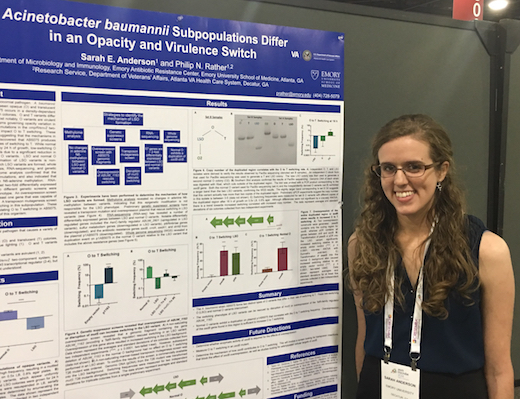We are excited that the ASM Microbe meeting will be at the Georgia World Congress Center from June 7 to June 11. If you are interested in antibiotic resistance, you can learn about how to detect it, how to (possibly) defeat it and how the bacteria fight back.
A host of Emory microbiologists are participating. In some cases, our scientists are presenting their unpublished data for discussion with their colleagues at other universities. Accordingly, we are not going to spill the beans on those results. However, please find below some examples of who’s talking and a bit of explanatory background. ASM Microbe abstracts are available online for posters, but not for some symposiums and plenary talks.
David Weiss lab — Klebsiella
Graduate student Jessie Wozniak is presenting her research on an isolate of Klebsiella that combines alarming properties. She will describe how the bacterial colonies behave (unappetizingly) like stretchy melted cheese in a “string test.”
June 9, 11 am to 1 pm, June 11, 11 am to 1 pm
Christine Dunham – toxin-antitoxin/persistence

Graduate student Sarah Anderson presenting her poster at ASM Microbe. She discussed a genetic connection between virulence switch and antibiotic resistance.
Dunham, a structural biologist, is giving a plenary talk June 11 on toxin-antitoxin pairs, which play a role in regulating bacterial persistence, a dormant state that facilitates antibiotic resistance. Two past papers from her lab.
Phil Rather lab – Acinetobacter baumannii
Rather’s lab recently published a Nature Microbiology paper on A. baumannii’s virulence/opacity switch. This type of bacteria is known for hospital-associated infections and for wound infections in military personnel. Poster talk by graduate student Sarah Anderson June 8. Read more





